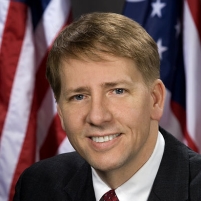Court Guts Ohio Law that Helped GOP by Prohibiting Medicaid Doctor Campaign Donations
Monday, August 13, 2012
 Richard Cordray
Richard Cordray
An Ohio law prohibiting doctors from contributing to political campaigns has been ruled unconstitutional by the federal Sixth Circuit Court of Appeals in Cincinnati. The law, on the books since 1978, barred physicians who participate in the Medicaid program from donating to candidates running for state Attorney General or county prosecutor. It also banned contributions from any person with an ownership interest in a Medicaid provider. Because Medicaid providers have an interest in protecting and expanding the Medicaid program, the law was widely perceived to benefit Republican candidates at the expense of Democrats.
The case, Lavin v. Husted, was filed by nine Ohio physicians who accept Medicaid reimbursement for providing health care to poor Ohioans. When they tried to contribute to Democrat Richard Cordray’s 2010 campaign for reelection as Ohio Attorney General, his campaign refused their donations because of the law. The doctors sued the Ohio Secretary of State, claiming the law was an unconstitutional violation of their First Amendment rights. In July 2011, a federal judge in Cleveland ruled in favor of the law, reasoning that it was supported by a general interest in “preventing corruption,” because donations from Medicaid providers might cause the Attorney General or county prosecutors not to go after them for Medicaid fraud.
The Sixth Circuit rejected that argument as speculative, observing that “the Secretary concedes that he has no evidence at all” that any prosecutor in Ohio or elsewhere had been corrupted by Medicaid provider contributions or that the law “prevents actual or perceived corruption among prosecutors in Ohio.” Going further, the Court pointed out that in 2009 only 97 Ohio Medicaid providers were prosecuted for Medicaid fraud, yet the law barred all 93,000 Medicaid providers from making campaign contributions, concluding that “the ban is vastly more restrictive than necessary to achieve its stated goal.”
The court also implied that a less restrictive law banning contributions from Medicaid providers who have been penalized for billing violations or convicted of Medicaid fraud, or even limiting without totally banning contributions by all Medicaid providers, might be constitutional.
- Matt Bewig
To Learn More:
Lavin v. Husted (U.S. Court of Appeals Sixth District) (pdf)
- Top Stories
- Unusual News
- Where is the Money Going?
- Controversies
- U.S. and the World
- Appointments and Resignations
- Latest News
- Trump to Stop Deportations If…
- Trump Denounces World Series
- What If China Invaded the United States?
- Donald Trump Has a Mental Health Problem and It Has a Name
- Trump Goes on Renaming Frenzy






Comments